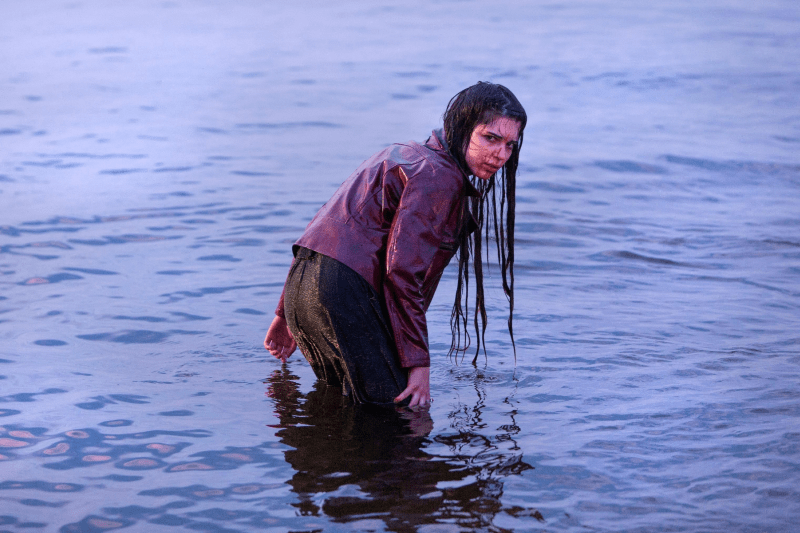Most people are familiar with the story of The Little Mermaid: a young mermaid exchanges her tail for legs and sacrifices her voice to be with the human man she loves. And now Polish director Agnieszka Smoczynska (Fugue, The Silent Twins) and writer Robert Bolesto (The Last Family, The Field Guide to Evil) have brought to life a campy, bloody, glittery, musical version of this story in their 2015 film The Lure.
Set in the 1980s, The Lure introduces horror fans to two young mermaid sisters, Golden (Michalina Olszańska) and Silver (Marta Mazurek). One night, the sisters stumble upon a band drinking and singing on the beach. At first, it seems the sisters plan to eat the two men in the band, but instead, the group pulls the mermaids from the water and takes them back to the club where they work. When in the water, Golden and Silver have long, beautiful fish tails instead of legs, with a slit for their reproductive organs. When out of the water and dry, their mermaid tails turn to human legs; although in this form, their reproductive organs disappear, giving Golden and Silver a Barbie-like appearance. As soon as the club manager meets these miraculous young women, he immediately hires them to sing, strip, and transform on stage as part of a regular act at the club.
As with other Uterus Horror films previously examined in this column, The Lure focuses on two sisters with very different mindsets to show both sides of their coming-of-age journeys. While we don’t know how old these mermaids are, it’s apparent they are young and inexperienced in the world around them. It also seems that Golden might be older than Silver, or at least the more protective of the sisters. As they go down this path together, Golden wears humanity like it’s just another costume for her nightclub performances. To her, this is just a short adventure before the sisters return to the sea and swim to America. Silver, on the other hand, quickly becomes infatuated with human life. In fact, Silver loves human life so much that she even falls for the bassist in the band, Mietek (Jakub Gierszal).
Silver makes her interest in Mietek clear early on. Unfortunately, between her tail and lack of human genitals, Mietek says he could only see Silver as an animal. That doesn’t dissuade her affections. Instead, she attempts to please him in other ways as she tries to come up with a plan to become human. Meanwhile, Golden uses her seductive mermaid abilities to lure a club patron to a remote spot by the water to feed on him. She keeps this kill a secret, even from Silver, knowing her sister would not approve.
Soon after, Silver and Golden meet a merman at the club named Tryton (Marcin Kowalczyk). Silver has no interest in interacting with him, but Golden is fascinated. Triton has his own metal band and speaks to Golden about her potential. He also warns Golden about Silver. He explains that if Silver removes her tail to replace it with legs, she will lose her siren song. What’s worse, if Silver falls for a human and he ends up marrying another, she will turn to sea foam. Golden is both worried about Silver and fascinated by Tryton. The sisters are familiar with what Tryton says, but Silver believes them to be old wives’ tales. From how the sisters interact with this older, more experienced merperson, it’s easy to see Golden and Silver are young, naïve, and inexperienced in both the mer and human world.
Soon after, news gets out about the murdered man. Not only does Silver immediately know Golden did it, but the rest of the band puts the pieces together as well. Golden and Silver argue, but just as they seem to be coming together, the band knocks the sisters out and dumps their unconscious bodies into the sea. The girls find their way back to the club, where Silver simply embraces Mietek while Golden bites a finger off another band member. Even their reactions to this betrayal show how Silver is willing to look past all transgressions for the human boy she loves, while Golden is only along for the ride because of her sister.
Despite Tryton’s warnings and despite the band’s horrible treatment of the young mermaids, Silver still wants to remove her tail to be with Mietek. She finds a doctor who performs the surgery, cutting off Silver’s tail and giving her the lower half of a female cadaver. Unfortunately, as warned, she does lose her voice. Before Silver can even fully walk on her new legs, she tries out her new genitals attempting to have sex with Mietek. It doesn’t go quite as planned, and Mietek is disgusted when Silver’s surgical cuts bleed on him during sex, mirroring how men are often disgusted by a woman bleeding the first time she has sex. Through it all, Silver is still ever hopeful and love-struck, while Golden does her best to balance disagreeing with Silver’s decisions and being a supportive sister. Even when the club manager fires the now-voiceless Silver and offers Golden a solo act, Golden refuses because she will only sing with her sister.
Things get drastically worse for Silver after she removes her tail. As if losing her tail and her voice aren’t bad enough, Mietek eventually leaves her for another woman. In no time at all, Mietek and this new girl get married with Golden and Silver in attendance. Tryton appears, once again warning Golden that her sister is on the verge of becoming sea foam. The only way Silver can survive is if she eats Mietek before the sun rises. Golden pleads with her sister to kill the man who abandoned her. Silver goes to Mietek one last time, and the two dance on the deck of the boat where the wedding took place. Golden watches, waiting for her sister to kill the human. At the very last moment, Silver chooses to let the human she loves live, knowing it means her end. As the sun rises and shines on Silver, she turns to sea foam in Mietek’s arms. Golden, in a fit of rage and despair, rips Mietek’s throat with her teeth before fleeing into the water, alone without the sister she loved.
Silver’s journey has many similarities to the story of The Little Mermaid. She gives up every piece of herself in an effort to become something she isn’t just to win the love of a mediocre white man. It’s a huge, life-altering decision made by someone who is essentially a child, naive to the world around her. What makes The Lure so interesting and impactful is the inclusion of Golden. Throughout it all, Golden is the perfect opposite of her sister. She is also naïve and curious about the human world, but she has no desire to truly be part of it. She longs for the sea and only cares about her sister, singing, and feasting on human flesh.
Having these two sisters who adore each other but have very different worldviews allows for an interesting juxtaposition. Silver gives up everything for someone who could never love her back, while Golden embraces her mermaid nature, even as she tries to be there for her sister. The Lure highlights the impulsivity of youth and how dangerous that can be when you’re trying to find your place in the world. Silver’s story is tragic because she rejects who she really is. Golden’s story is more positive, despite the tragedy of losing a sister, because she embraces her true nature. If audiences learn anything from watching Golden and Silver, it’s that happiness comes from accepting who you are, not from changing yourself to make others happy.
About this series: in a genre typically considered “for the guys,” it’s time to give a nod to the ladies. Uterus Horror is a subgenre of horror films that focuses on the uniquely female experience of puberty and the act of coming into your sexuality, using horror elements to emphasize and/or act as a metaphor for that experience. These films are often ignored in theaters but quickly develop cult followings. Columnist Molly Henery, who named and defined the subgenre, tackles a new film each month and analyzes how it fits into this bloody new corner of horror.






